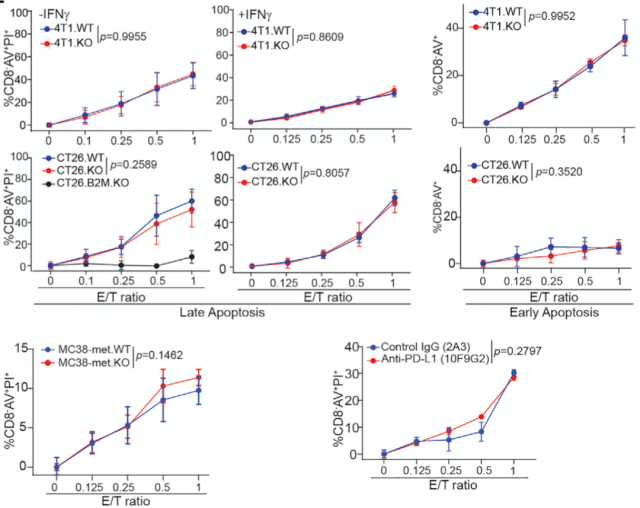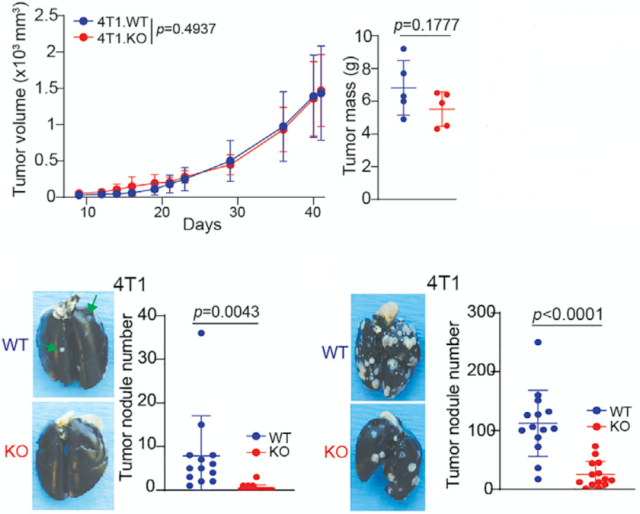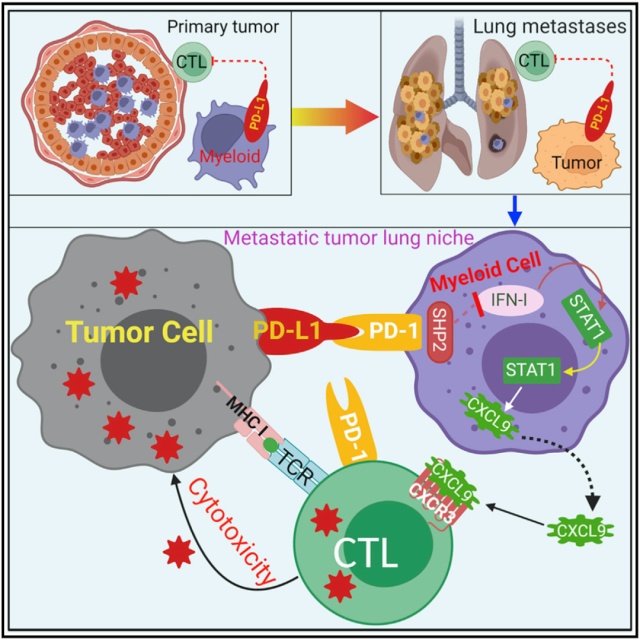Major Discovery: Cancer cell PD-L1 does not inhibit T cell toxicity
- Aspirin: Study Finds Greater Benefits for These Colorectal Cancer Patients
- Cancer Can Occur Without Genetic Mutations?
- Statins Lower Blood Lipids: How Long is a Course?
- Warning: Smartwatch Blood Sugar Measurement Deemed Dangerous
- Mifepristone: A Safe and Effective Abortion Option Amidst Controversy
- Asbestos Detected in Buildings Damaged in Ukraine: Analyzed by Japanese Company
Major Discovery: Cancer cell PD-L1 does not inhibit T cell toxicity
- Red Yeast Rice Scare Grips Japan: Over 114 Hospitalized and 5 Deaths
- Long COVID Brain Fog: Blood-Brain Barrier Damage and Persistent Inflammation
- FDA has mandated a top-level black box warning for all marketed CAR-T therapies
- Can people with high blood pressure eat peanuts?
- What is the difference between dopamine and dobutamine?
- How long can the patient live after heart stent surgery?
Major Discovery: Cancer cell PD-L1 does not inhibit T cell toxicity.
“Cancer Cells”: Major Discovery of Cancer Immunotherapy! Scientists have confirmed for the first time that cancer cell PD-L1 does not inhibit T cell toxicity, but inhibits T cell infiltration into metastatic lesions and promotes cancer metastasis
When PD-1/PD-L1 inhibitors have been used for nearly 10 years, scientists can still discover new mechanisms to refresh the cognitive level around PD-L1.
Recently, a research team led by Professor Liu Kebin from the Medical College of Georgia in the United States published a major research result in the famous journal “Cancer Cells” [1].
This paper has two unexpected new findings : first, tumor cell PD-L1 does not directly inhibit the toxicity of cytotoxic T cells ; second, tumor cell PD-L1 has no protective effect on the primary tumor, but through Combines with PD-1 of metastatic myeloid cells, inhibits the infiltration of cytotoxic T cells into metastatic foci, and promotes the growth of metastatic tumors .

Screenshot of paper home page
Today, we all know that immune checkpoint inhibitors mainly play an anti-cancer role by blocking the PD-1/PD-L1 signaling pathway.
Among them, PD-1 mainly refers to PD-1 on the surface of cytotoxic T cells, and PD-L1 mainly refers to PD-L1 on the surface of cancer cells[2].
At present, there is little controversy about the function of PD-1 and its downstream signaling pathways. However, whose PD-L1 affects the activity of T cells through PD-1 is still controversial .
A large number of studies based on mouse models have found that PD-L1 of immune cells such as dendritic cells and macrophages plays a leading role in inhibiting the anti-tumor response of T cells [3]; only one study found that PD-L1 of tumor cells -L1 (tPD-L1) is sufficient to suppress the toxicity of cytotoxic T cells to promote tumor immune escape in a mouse model of colon cancer [4].
However, human clinical studies have found that tumor cell PD-L1 or tumor cell combined with immune cell PD-L1 is the strongest indicator of prognosis [5,6].
According to Professor Liu, the discrepancy between the results of the mouse study and the clinical study may be due to the different anatomical locations of the tumors.
In preclinical studies, most of the deaths of mice were caused by excessive tumor burden similar to the primary tumor; while the deaths of cancer patients were mainly caused by cancer metastasis .
Therefore, tumor cell PD-L1 may have an unknown important role in cancer metastasis.
In order to understand the function of tumor cell PD-L1, Professor Liu’s team selected four cancer cell lines expressing PD-L1 : triple-negative breast cancer cell line 4T1, microsatellite-stable intestinal cancer cell line CT26, metastatic microsatellite-invariant Stable intestinal cancer cell line MC38-met, melanoma cell line B16-F10. They also constructed a one-to-one corresponding PD-L1 knockout cancer cell line based on the above four cell lines .
They mixed the above 8 cell lines with a cytotoxic T cell line, and found that T cells showed dose-dependent cytotoxicity to all cancer cell lines , and the co-culture of T cells and normal cancer cell lines would also lead to both The expression levels of PD-1 and PD-L1 were increased.
They also found that the expression of PD-L1 had no protective effect on cancer cells, and even the addition of PD-1 inhibitors had no protective effect .
Professor Liu believes that this shows that in the absence of a tumor microenvironment, when cancer cells and T cells are 1V1, whether or not expressing PD-L1 is the same for cancer cells .
In fact, this also implies that the interaction between tumor cell PD-L1 and T cell PD-1 may not affect the toxicity of T cells.

PD-L1 of tumor cells is not protective in vitro
So does this phenomenon also exist in the body?
Didn’t expect it to exist.
The presence or absence of PD-L1 did not affect tumor size regardless of which cell line pair was injected into the mice .
This again shows that tumor cell PD-L1 does not help the growth of the primary tumor . This really refreshed my cognition!
Next, Liu’s team took triple-negative breast cancer 4T1 (which can spontaneously develop lung metastasis) as an example to explore the effect of tumor cell PD-L1 on cancer metastasis.
They found that after the mouse mammary glands were inoculated with two kinds of cancer cells, tumor cells expressing PD-L1 had more lung metastases and a heavier tumor burden, while the ability of lung metastasis of 4T1 cells with PD-L1 knockout was significantly reduced. weaken . Similar phenomena were also found in several other cell lines.

Tumor cell PD-L1 does not affect the growth of primary tumors but affects the growth of metastatic tumors
In subsequent studies, Liu’s team confirmed that although tumor cell PD-L1 did not protect the primary tumor, PD-L1 on the surface of myeloid cells did protect the primary tumor .
This finding well explains the previous human-mouse differences.
After determining that tumor cell PD-L1 promotes metastasis and does not protect the primary tumor, the question Liu’s team has to solve is how exactly does tumor cell PD-L1 promote cancer cell metastasis.
To answer this question, they first compared the effect of PD-L1 expression status on the primary and metastatic tumor microenvironment. It was found that after 1 day after inoculation, there was no difference in the initial cancer cells in the lungs of mice regardless of whether PD-L1 was knocked out.
They also noticed that compared with normal 4T1, the infiltration of CD3-positive cells in the lung metastases of PD-L1 knockout 4T1 was increased, but the primary tumor was not; Whether or not, the same pulmonary metastases can be formed.
These data indicate that tumor cell PD-L1 does not affect the dissemination of cancer cells, but helps cancer cells in metastases evade the killing of cytotoxic T cells .
How is this possible?
After a series of complex experiments, Liu’s team found that the combination of metastatic tumor cell PD-L1 and myeloid cell PD-1 (mPD-1) would activate SHP2 and downregulate IFN-I→STAT1→CXCL9, which would recruit cytotoxicity The signaling pathway of T cells, thereby inhibiting the infiltration of T cells to metastases , rather than inhibiting the lethality of T cells through the PD-1/PD-L1 pathway.

Mechanism diagram
In general, the research results of Professor Liu’s team have given us a new understanding of cancer immunity.
Let us know that the PD-1/PD-L1 signaling pathway is far more complicated than we thought, and its function is not only related to the cell type, but also related to the anatomical site of the tumor.
More importantly, this research has given us a deeper understanding of immune neoadjuvant and adjuvant therapy, and also consolidated the theoretical basis of these two therapies.
references:
[1].Klement JD, Redd PS, Lu C, et al. Tumor PD-L1 engages myeloid PD-1 to suppress type I interferon to impair cytotoxic T lymphocyte recruitment. Cancer Cell. 2023;41(3):620-636 .e9.doi:10.1016/j.ccell.2023.02.005
[2].Tumeh PC, Harview CL, Yearley JH, et al. PD-1 blockade induces responses by inhibiting adaptive immune resistance. Nature. 2014;515(7528):568-571. doi:10.1038/nature13954
[3]. Oh SA, Wu DC, Cheung J, et al. PD-L1 expression by dendritic cells is a key regulator of T-cell immunity in cancer. Nat Cancer. 2020;1(7):681-691. doi :10.1038/s43018-020-0075-x
[4]. Juneja VR, McGuire KA, Manguso RT, et al. PD-L1 on tumor cells is sufficient for immune evolution in immunogenic tumors and inhibits CD8 T cell cytotoxicity. J Exp Med. 2017;214(4):895- 904. doi:10.1084/jem.20160801
[5].Yoon HH, Jin Z, Kour O, et al. Association of PD-L1 Expression and Other Variables With Benefit From Immune Checkpoint Inhibition in Advanced Gastroesophageal Cancer: Systematic Review and Meta-analysis of 17 Phase 3 Randomized Clinical Trials. JAMA Oncol. 2022;8(10):1456-1465. doi:10.1001/jamaoncol.2022.3707
[6].Zou Y, Zou X, Zheng S, et al. Efficacy and predictive factors of immune checkpoint inhibitors in metastatic breast cancer: a systematic review and meta-analysis. The Adv Med Oncol. 2020. doi:10.1177/1758835920940928
Major Discovery: Cancer cell PD-L1 does not inhibit T cell toxicity
(source:internet, reference only)
Disclaimer of medicaltrend.org
Important Note: The information provided is for informational purposes only and should not be considered as medical advice.



